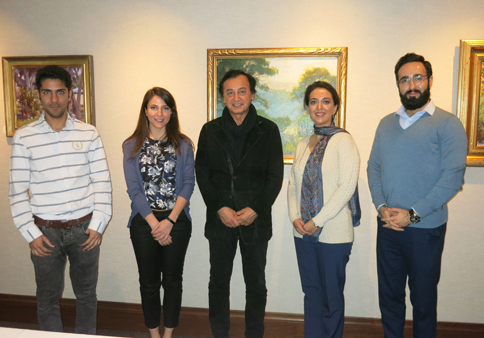Fellowship Supports Iranian Civil Engineering Graduate Students
 April 24, 2018 - Anyone growing up in Iran over the past half century has been aware of the drying up of Lake Urmia, the country’s largest saltwater lake. Once a haven for birds and vacationers, the lake has shrunk in size by about 80 percent in the past 30 years. Warming climate, drought and poor water management are the likely culprits. The loss of water is having socioeconomic and human health impacts on the region, and it is no wonder engineers from the area are interested in careers and research in water-related fields.
April 24, 2018 - Anyone growing up in Iran over the past half century has been aware of the drying up of Lake Urmia, the country’s largest saltwater lake. Once a haven for birds and vacationers, the lake has shrunk in size by about 80 percent in the past 30 years. Warming climate, drought and poor water management are the likely culprits. The loss of water is having socioeconomic and human health impacts on the region, and it is no wonder engineers from the area are interested in careers and research in water-related fields.
Four such engineering graduate students from Iran have been able to come to the U.S. and pursue their studies at UC Irvine, thanks to generous fellowship support from Orange County entrepreneur and philanthropist Fariborz Maseeh. The students – Mohammad Faridzad, Negin Hayatbini, Vesta Afzali and Mojtaba Sadeghi – are studying under the tutelage of Distinguished Professor Soroosh Sorooshian, a recognized researcher in hydrometeorology, remote sensing and water resources, and director of the UCI Center for Hydrometeorology and Remote Sensing (CHRS). Sorooshian and Maseeh also were born in Iran.
“We are a global program and destination for graduate students from all over the world,” said Samueli School Dean Gregory Washington. “This valuable fellowship support allows us to provide opportunities for these students and increase our global impact.”
“Because of Fariborz Maseeh’s keen interest in the health of the environment, and after visiting our center, he decided to establish this fellowship, which has allowed four bright Persian students to come to the U.S. and conduct research at UCI,” said Sorooshian. “There are so many talented students in Iran that could flourish and make a contribution if given the opportunity.”
Maseeh’s gift of $25,000 per fellowship ($100,000 in total) was awarded through his Massiah Foundation and matched by the UCI Office of Research. The fellowship funds one year of graduate study.
There are three Maseeh Fellows for Earth Climate and Ecosystem Protection and one Masimo Foundation Fellow (named in recognition of Joe and Sarah Kiani of the Masimo Foundation).
Mohammad Faridzad, who grew up in Tehran, was the first to receive the fellowship. “Coming to UCI to work with Soroosh Sorooshian in the CHRS, which has one of the most prestigious reputations in the world in remote sensing and water resources management, was a dream come true,” he said.
Faridzad was earning his bachelor’s degree in civil and environmental engineering at AmirKabir University of Technology when he became interested in environmental issues – air pollution, waste management and water. He completed his master’s degree in environmental engineering at Sharif University of Technology and worked for two years on water-resource issues surrounding Lake Urmia and its watershed at the Remote Sensing Research Center, as part of the Urmia Lake Restoration Program.
He began his doctoral studies at UCI in 2015 and is creating a framework that can help developing countries apply remote-sensing precipitation information to the design of water-resource management solutions.
Negin Hayatbini also grew up in Tehran. Her father wanted her to follow in his footsteps and become a doctor. But her strength was in math and physics rather than biology. She earned a bachelor’s degree in civil and environmental engineering from Zanjan National University, and then moved to Sharif University of Technology to complete a master’s degree in civil engineering. She worked as a technical consultant for a civil engineering company in Tehran for a few years while working on her master’s thesis on water resources engineering and management. She was aware of the reputation and prestigious work of Sorooshian in her field and was determined to apply for the fellowship.
At the CHRS, Hayatbini is using her knowledge in data and computer science to improve the precipitation prediction process. “I am working on improving precipitation retrieval algorithms for more accurate rainfall estimation by taking advantage of two or more channels of satellite information,” she said. “This work I hope will help people around the world who are susceptible to undesirable impacts of climate change.”
Mojtaba Sadeghi was born in Birjand, one of the smallest towns in the country, located approximately 700 miles from Tehran. Sadeghi studied from primary school through high school in Birjand. He successfully passed the entrance exam to Sharif University and graduated with a bachelor’s degree in civil engineering. In 2017, he applied to many universities and was grateful to receive the fellowship grant and be able to conduct research under the supervision of Sorooshian. Sadeghi is completing his master’s degree in civil engineering focusing on hydrology and water resources engineering.
The final awardee is the Masimo Fellow, Vesta Afzali, who hails from Kerman, Iran. After completing her bachelor’s degree in civil engineering at Shahid Bahonar University, she earned a master’s at the Graduate University of Advanced Technology in Kerman. As a civil engineer with an interest in hydrologic models, water-resources analysis and climate change, Afzali conducted graduate research that dealt with the impact of climate change on Iran’s water resources. While working on her master’s, she served as a quality control manager in one of the biggest ready-mix concrete plants in Iran. Later, she worked as head of research and development. In 2016, Vesta applied to the UCI civil engineering doctoral program to advance her career, and she is currently pursuing her Ph.D.
– Lori Brandt
